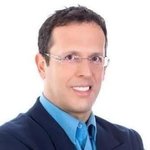05
Nov 2019
Adaptive Leadership Practiced in Education
I was nine when my mother told me we would be leaving Israel for a year to join my father, at the time a shaliach with the Jewish agency in London. I was looking forward to the family reunion, but then tearfully asked, “How will I do there? I don’t know any English and I do not know any children there my age.”
My mother looked at me with her beautiful brown eyes and said simply, “You’re a smart child. You are friendly. You’ll be fine.”
She was right. Not so much about the facts of me being smart or friendly. She was right because she gave me the self-confidence to face a major change in life and to overcome it.
As I see it, after 22 years of working as a teacher, a school principal, a head of an educational department and a network director, that is the point. The most important point. I believe that the most important thing that a student needs to have in his virtual backpack when he leaves school at the age of 18 consists of three things:
- Self-confidence – a good understanding of one’s strength and weakness points.
- Social confidence – understanding the ways one acts around others. Where they feel strong and where their social blind spots are.
- Value confidence – the faith they have in some value or belief that is bigger than themselves. Social, religious or other.
These three themes are my version to adaptive leadership as practiced in the educational field. I believe these three kinds of confidence give us the power to withstand changes, take good opportunities and challenge threats in our lives. I think most of the educational systems in the world don’t think or work this way. Too much energy, time and money are invested in exams and in trying to fit a standard which, for a lot of students, maybe even most of them, is not relevant for their happiness and for their success in life.
So, if you have reached this far, I will try to offer a few examples of adaptive leadership that can make a difference in the very conservative educational systems around the world.
First and foremost, I think educational systems should teach students of all ages the importance of flexibility and adjustment to changes in life. This can be done in various ways.
I am writing this article in Mexico City on a scholar’s seminar that brings students from all over the world to get to know each other and learn different cultures and ways of life. The thing that struck and amazed my students the most was the way the Mexicans treat their dead. In opposition to the western way of thinking, the Mexicans look at death as something normal, a part of life and not as a tragedy. They celebrate the festival of the dead (on the first weekend of November) eating, decorating the graveyards and talking about the good deeds of the dead. This is very different from the memorial days in Israel or in America. As we were reflecting on this with our students, they understood that this was a lesson in culture-flexibility, which will help them a lot in life.
Most of the schools I’ve seen over the years have a very fixed schedule. Schools are, in general, fixed on their theme, their way of learning and their methods of studying. It’s very convenient, but also ineffective for growing up to be flexible adults. Another way – specific to the pedagogy – to teach students to be adaptive is to make them ask questions and focus on them, instead of focusing on the answers. So many times I’ve heard teachers answering students that asked “why” with the phrase, “that’s how it is.”
As I was growing up in the yeshiva, I learned a story about the Rosh Yeshiva, Rabbi Yehuda Amital, who welcomed a visitor and his son. Rav Amital asked the student, “do you like the school you are learning in?”
The student answered proudly, “Yes, in my school we have all the answers!”
“Very bad” said the Rosh Yeshiva. “I prefer a school that has all the questions.”
An important way to demonstrate adaptive education is to give a lot of space for making mistakes and to learn professional ways of self-inquiry and correctness.
Following the same theme of work, I think a lot of schools lack the option to make mistakes and learn from them. School is a place that teaches you to be right and to get the right answer. In order to truly learn, you must give time for the wrong answer. You must learn why your mistake was made, what brought you to the wrong answer and how you will get it right the next time. Most of the schools don’t give attention to learning from mistakes and are focused mainly on fixing them. This has direct connection to the story I wrote above from Rav Amital.
I think the organization that is the most creative and practices educational adaptive leadership that I have seen is the pre-army mechinot, which is a unique educational system built in Israel. There are about 60 pre-army institutes in Israel, each holding 30–100 students. The students are split into little leadership groups and each takes responsibility over one area of interest to lead their friends over the year in various activities. A lot of time is given to outdoor hikes, community volunteering and studies such as philosophy, Jewish history and leadership. As opposed to high schools, the agenda of each institute is very flexible and the goals given by the government, which funds a big part of the mechinot budget, are very general.
I got to know a few initiatives that try to take this unique model and bring it into high schools. It works! I believe we will see schools in Israel looking more like mechinot and new ways of working with students will come into action.
And one last point. My most important achievement as a high school principal was opening the school doors to students from different districts and other social backgrounds. The most important program I founded as the head of the educational department of Jerusalem was a shared education initiative bringing together students from eastern and western Jerusalem. Over 80 Arab and Jewish schools took part in this outgoing program and more than 20,000 students shared time learning with students that are considered not only different from them, but are perceived as enemies. That’s the way to grow up to be adaptive adults who believe things can change and that adaptive education could lead us to a better future. I believe!

Photo by Nick Hillier on Unsplash.
Get To Know The Author
 Wexner Senior Leader Moshe Tur-Paz (2017) was recently appointed Director General of the World ORT Kadima Mada Educational Network in Israel. Moshe was Director of the Municipal Department of Education in Jerusalem and sat on the board of the Ministry of Education, was Director of the Rene Cassin Society in the Science Museum and the Jerusalem Institute for the Research of Israel and was Chairman and voluntary Acting Director for the Movement for Trustees of Torah and Work. Moshe serves as a lieutenant colonel in the IDF reserves. He holds an MA with honors in Jewish history and has a teacher’s certificate.
Wexner Senior Leader Moshe Tur-Paz (2017) was recently appointed Director General of the World ORT Kadima Mada Educational Network in Israel. Moshe was Director of the Municipal Department of Education in Jerusalem and sat on the board of the Ministry of Education, was Director of the Rene Cassin Society in the Science Museum and the Jerusalem Institute for the Research of Israel and was Chairman and voluntary Acting Director for the Movement for Trustees of Torah and Work. Moshe serves as a lieutenant colonel in the IDF reserves. He holds an MA with honors in Jewish history and has a teacher’s certificate.
Other posts by this author ›

